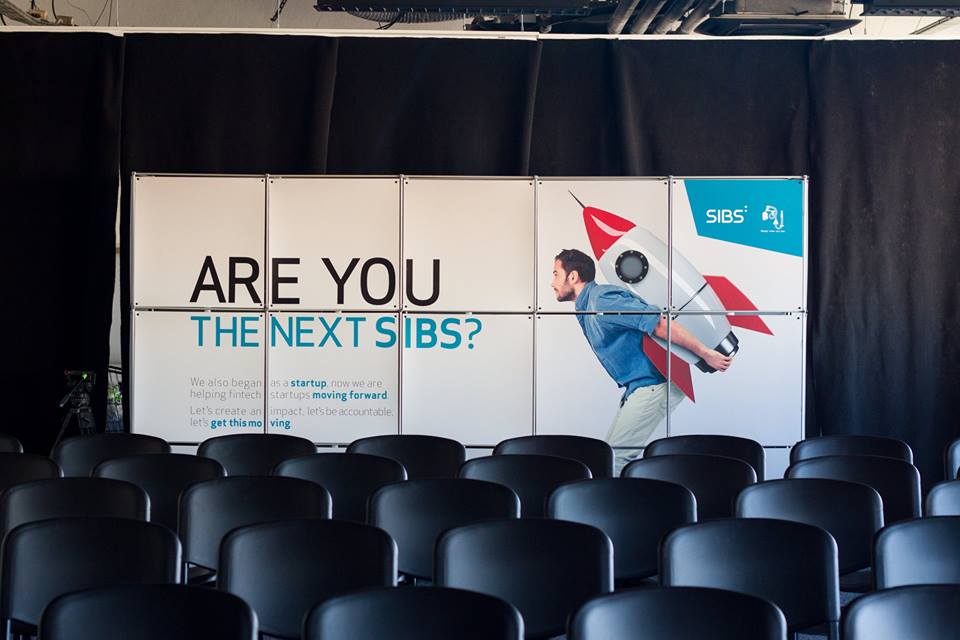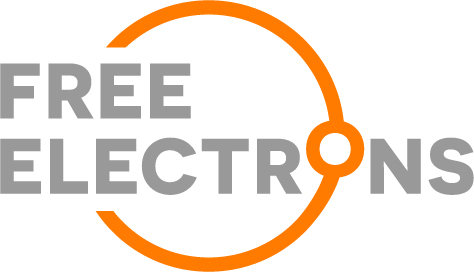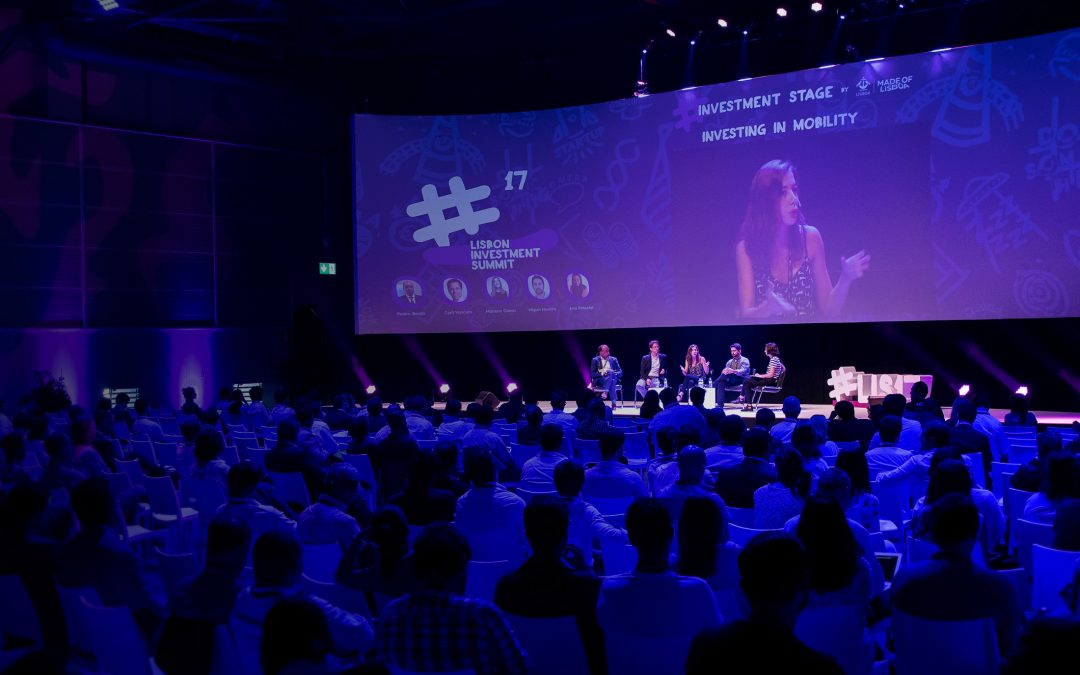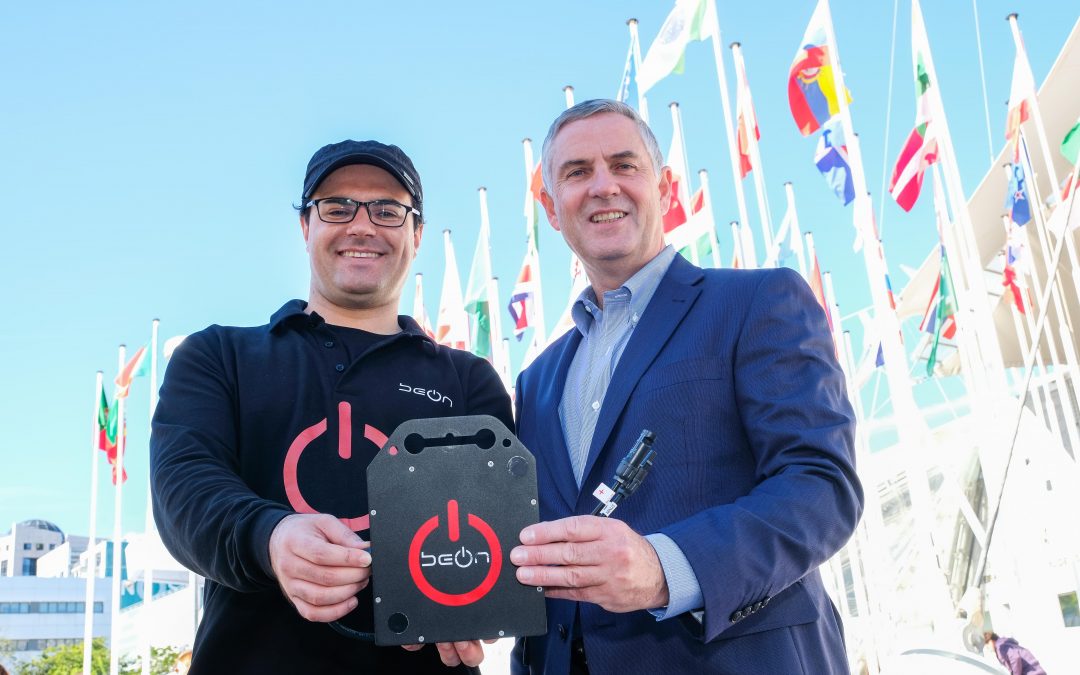
by Carolina Santos | Feb 21, 2018 | Corporates, Startups
The second edition of SIBS PAYFORWARD, an acceleration program done in partnership between SIBS and Beta-i, has already selected the startups for its Bootcamp, from more than 100 startups from 20 different countries. The number of startups applying is impressive, in comparison with last year, considering this edition was mainly focused on startups with Open Banking API solutions.
This change from the first edition reflects the “hot topic” in Europe right now and its challenges: PSD2. What is amazing is that the program was able to captivate startups from the United States or Asia where this topic isn’t that trendy right now. This shows not only the success of the first edition but also the current importance SIBS open innovation approach has worldwide.
The 10 startups attending the Bootcamp were chosen after being carefully evaluated and are focused in areas such as: analytics, clients, payments and security. The lucky 10 are:
Coinscrap Finance
It’s a smartphone app that allows users to round up their daily purchases and automatically save the spare change into financial products such as saving insurance, life insurance or pension funds.
Gofact
It aggregates invoicing, expense management and bank account management.
Gofact works with integrated solutions in identity, communication and management. A cloud billing solution made for the micro-entrepreneur.
Infin8
Infin8 created the only mobile banking app that people will ever need regardless of how many banking products they have in different banks. The goal is to carry out all daily banking needs from a single app, making people forget about the financial jargon.
Limitless App
It’s a mobile app which aims to help banks and other financial institutions help Millennials save their own Money. The money is transferred to a dedicated “savings” account rather than invested. Then, some of savings will be invested into risk appropriate, low-cost funds so that clients can achieve their financial goals even faster.
MoneyGarden
It’s a financial platform which offers to users a holistic approach to personal financial planning and wealth management. It also offers a consolidated view of all income, spending and assets. It also shows to customers where they can save money and help them to better invest their money.
Nextgen
It’s an integrated and an inter-operable financial inclusion solution which uses multiple base hardware solutions (SIM overlay, the secure microSD card and a low cost NFC reader for an 360 degree offering on enabling financial inclusion at the last mile and for the masses).
SEZA.ME: FinPin Technologies
It provides a secure and simple new way of secure logins to potentially all existing password protected accounts by leveraging a mobile phone for primary authentication where possible and for secondary authentication where necessary.
SimbaPay
Choose the country to send money to, add the mobile or account number of your recipient, add the amount you’d like to send and include a personal message. SimbaPay, manages the money and risk of the transfer.
Spin Analytics
It brings digital transformation in Credit Risk Management by leveraging predictive analytics, AI and ML techniques on Big Data. It helps business and financial leaders to reformulate their challenges and Convert Data into Actionable Intelligence. Its product implements Credit Risk Models’ development and maintenance by leveraging predictive analytics, AI and ML techniques on Big Data.
Sstrategy
It has a platform called Debit2Go which aims turning enterprise data and transactional banking operations into loyalty & business outcomes. Sstategy enables turning customers into subscribers through the use of SDD (SEPA Direct Debit Scheme) linked to the Subscription Economy phenomena.
During the Bootcamp that is taking place from February 26 to March 2, the selected startups will have the opportunity to learn about payments and tech financial solutions, SIBS’s core business, besides having access to the people who work at different branches of the company developing the services the company has both in Portugal and abroad. As if this wasn’t enough the startups will also be part of the biggest Open Banking ecosystem in Portugal.
The bootcamp also includes individual coaching, which means learning how to pitch, workshops and mentoring sessions, considered crucial for startups to improve their business plans as well as adjust their products to the market where SIBS works.
After this 10 weeks of acceleration awaits the startups with the main goal to integrate them at SIBS and that can turn into business, partnerships and even investment.
Everyone involved is eager for the Bootcamp to start. Maria Antónia Saldanha, Brand and Communication Director at SIBS, says “we are very excited with this new phase. The selected startups are all very interesting and we’re looking forward to see how it goes during the bootcamp”.
Manuel Tânger, Co-founder and Head of Open Innovation at Beta-i, has an advice to the startups that made it this far “look at what SIBS is doing and look at the opportunities both inside and outside Portugal where SIBS operates”. And Francisco Carvalho, Program Director, says that “the goal is a high number of conversion rate after the bootcamp, because that means that the quality of the startups, are, like we believe, really high. We’re aiming for seven pilots”.
Let the Bootcamp begin.

by Carolina Santos | Feb 12, 2018 | Startups
A lot as been said about Free Electrons, that’s an unique opportunity for energy startups, that eight giant utilities can change the life of those who apply to the program and that the winner is winning USD200,000. All of it true but there’s more to it.
There’s a “behind the scenes” that normally people don’t talk about on a program like Free Electrons, where winning is not the main goal but the opportunity to do business with the utilities. The business potential of Free Electrons is huge and startups know that, and if they don’t they should.
Let’s talk numbers: the program allows the fastest business-to-business relationship ever, it’s kind of a fast lane for business-to-business. For any startup to have this kind of relationship in such a short period of time it would involve spending a lot of money and due to this program they don’t need to spend a cent.
At the end of the Free Electrons 2017 third module, in Singapore, late September, the global financial value of the contracts signed between the 12 startups and the 8 utilities was about 2 million dollars, with a pipeline of opportunities being developed reaching over 12 million dollars. Who’s still thinking about the prize money?
Beon rapidly grew after winning the first edition, it has pilots with six utilities, but it wasn’t the only startup that benefited from the program. In the beginning of this month a portuguese digital newspaper wrote about Aperio Systems, a cybersecurity israeli startup, that was also on the program and won most innovative energy startup, that was invested 3,6 million euros by EDP Ventures (alongside Data Point Capital and Scopus Ventures).
There are some changes in this second edition in order to improve the experience for both startups and utilities. There will be a bootcamp but not a traditional one. Instead of selecting the 12 finalists, 30 will be chosen, they will be evaluated according to the most viable pilot and from that 12 will emerge.
Gonçalo Negrão, Program Director, believes that “the startups need to make the most of the time they have with the utilities” and when asked about what he truly wants for this edition he says “we want to establish efficient and long-term business relations between the startups and the utilities”. More than that he aims that this edition “is more than a program, is the beginning of the biggest energy community that ever existed and a step towards collaborative innovation”.

by Carolina Santos | Feb 8, 2018 | Corporates, Investors, Startups
Saying 2018 is going to be a good year for technology is overrated because every single year is good for it and is good for tech events. But in a world full of bigger and smaller events spread all over it’s always good to have a guideline and to know which ones would benefit you somehow – there’s many more than these ones.
These 10 events are listed in order of dates, not of size or importance, because all of them are equally important and I wish you can attend all of them (I wish I could, to network, of course).
- 4YFN – February 26-28 – Barcelona, Spain
4YFN is the startup business platform of Mobile World Capital Barcelona that enables startups, investors, corporations and public institutions to discover, create and launch new ventures together. Of course it has everything normally attached to this kind of event like networking activities, hackathons, workshops, congresses and open innovation programs.
This event is focused on startups, investors and corporates. Startups can expect a boost in their network and business opportunities. Investors can count on connecting with other investors from different markets and getting in contact with new startups. Corporates may expect help innovating and also meeting new startups which can help their business.
2. SXSW – March 9-18 – Houston, Texas
No presentation is needed for South by Southwest. For those who have been living in a cave, SXSW aims to help creative people achieve their goals. It’s a conference, it’s a festival, all rolled into one with features sessions, showcases, screenings, exhibitions and a lot of opportunities to network.
SXSW claims it’s the living proof that the most unexpected discoveries happen when diverse topics and people come together. It’s a matter of going there and seeing with your own eyes.
3. Wolves Summit – April 10-11 – Warsow, Poland
Innovation meeting business and capital, this is the best definition for Wolves Summit. The conference is dedicated to startups, investors, entrepreneurs, corporates and SMBs. On the way of its seventh edition the event is focused on inspiring, educating and guess what? Networking.
The goal is to create growth opportunities for emerging firms and investment, of course. Connections, innovative solutions, matchmaking tools, meet potential business partners and numerous specialists are all part of this event.
- Pioneers – May 24-25 – Wien, Austria
The most promising tech startups meet the world’s top investors and executives at the most amazing venue ever: the Hofburg Imperial Palace. Business meetings, inspiring innovations, founders stories and industry insights all come together in this event.
It’s a great place for startups to create meaningful business relationships with corporates, investors and tech innovators. It’s a win-win for everyone involved. Pioneers has unparalleled access access to European-wide tech leaders.
- Latitude 59 – May 24-25 – Tallinn, Estonia
This event gathers the Baltic, CEE and the Nordic tech ecosystem. They provide opportunities for entrepreneurs, investors and leaders to learn, connect and network.
Which translated would be something like exploring different startup themes, network with like-minded people, join their investor-startup matchmaking and exchange futuristic ideas. Why Estonia? Because it has most startups per capita in Europe (bet you didn’t know this) and it’s the only functional digital society in the world.
- Arctic 15 – May 30-31 – Helsinki, Finland
The event focus on industries and technologies from a wide range of topics such as Talent and Digital Health, Smart Cities and Virtual Reality. There’s a pre-event matchmaking to optimize the network, a Deal Room for one-on-one meetings and the already famous Pitch Competition.
Every year there’s between 1500 and 2000 attendees with more than 300 investors, 450 startups and 150 corporates. Smaller events are the perfect place to get to know who you really want and create lasting connections with those people, ones that can actually change the course of things.
- Lisbon Investment Summit – June 6-7 – Lisbon, Portugal
LIS, as it is known, is Europe’s surprisingly informal and slightly unexpected startup conference. The event gathers seasoned investors, daring entrepreneurs and innovative executives for a two-day casual, sunny and action-packed event.
With the motto #nobullshit the event attracts more than 200 investors, 750 startups, 400 corporates, 100 speakers and 2000 attendees work together towards creating unique networking opportunities and real investment.
- South Summit – September 3-5 – Madrid, Spain
South Summit connects the most innovative entrepreneurs with the most important investors in the world and the corporations seeking to improve their global competitiveness through innovation.
Grab the opportunity to attend keynote talks and debates with worldwide innovation leaders, meet with the largest business angels and VC firms and do some business and networking (what else?). Shape the future thinking outside the box in Madrid.
- Web Summit – November 5-8 – Lisbon, Portugal
There’s no introduction or explanation needed when it comes to Web Summit. For the third year in a row the largest conference in the world is held in Lisbon. The attendees range from Fortune 500 companies to smaller tech companies in a mix of CEOs and founders of tech startups.
We can’t predict how many people will be attending the conference this year, it’s too soon, but if it continues to grow like previous years it will sure have more than 60,000 attendees. It is important to say that Web Summit also runs events around the world, events that you shouldn’t miss as well such as RISE Conference in Hong Kong (July 9-12) and Collision in New Orleans (April 30 – May 3).
- Slush – December 4-5 – Helsinki, Finland
We’ve already wrote about Slush when Rodrigo Zwetsch attended the event last year. If you go to Slush know that it happens during the sh*ttiest weather season of the year. The conference, considered by some one of the best kept secrets, is proud of celebrating entrepreneurship.
The event has grown immensely from a 300 person assembly to more than 17,000 attendees, 2,300 startups, 1,100 investors and 600 journalists. Slush is a collision of a festival and a conference and it’s not a business, it’s a community of people who love what they do. The core of the event is to facilitate founder and investor meetings and to build a world-wide startup community. And we are sure that networking is also on their minds.

by Carolina Santos | Feb 6, 2018 | Corporates, Investors, Startups
First let’s start by explaining what is Regtech. A quick visit to Wikipedia will give you a kind of complex definition on Regulatory Technology it says it’s a new field within the financial services industry which uses information technology to enhance regulatory processes with the goal to tackle various regulatory problems, since it’s focused on regulatory monitoring, reporting and compliance benefiting the finance industry. This will make regulatory processes more transparent, consistent and standardized.
What this definition actually means is that regulatory technology helps banks meet regulatory requirements via technology and its exponential growth is mainly due to two reasons: the rapid development of FinTech, that has already proven its disruptive impact on financial services and the constant changes of financial regulation.
Regtech is here to produce efficient, cost-effective and innovative responses to regulatory demands. Until now financial institutions fought to keep up with new rules as well as understanding them, not to mention this was all done manually.
When Regtech first appeared in 2015 it was considered “a sub-set of Fintech”, now it has taken its own space and it’s rapidly separating itself from fintech. It is understandable why, banks don’t want to repeat the same mistakes from the past, the ones that took the financial system to collapse and some banks to bankruptcy, now, more than ever is important to manage risks, maintain the capital and create a more transparent financial sector.
According to International Banker “there are seven distinct areas within compliance and regulatory reporting that have the potential to be improved by regtech and those are: risk-data aggregation; modelling, scenario analysis and forecasting; real-time monitoring of payments transactions; identification of clients and legal persons; monitoring a financial institution’s internal culture and behaviour; trading in financial markets and identifying new regulations”.
All of the above are possible because of data analysis, machine learning and artificial intelligence. For example, Sybenetix, that was acquired by Nasdaq on September 2017, made behavioural analytics software to monitor individuals in financial institutions, looking out for things like unusual behaviour or suspicious activity that could be a sign of misconduct.
Some people believe regtech firms will start small but they’ll quickly grow and reach leading players in the market – Sybenetix is definitely a good example – this even before it reaches the masses, because when it does it’s a matter of months or a few years until it’s spread all over firm’s business strategies.
Regtech can be the next big thing, it matters and it’s extremely important and also won’t compromise Fintech place in the industry. Time will tell. But one thing is for sure is what we’re seeing right now is just the tip of the iceberg which means it’s a great business to invest in as well as a great business for a successful startup if you happen to have the skills.

by Carolina Santos | Jan 31, 2018 | Startups
When Rui Beon, as he is now known, won Free Electrons last year he made an emotional speech that he claims “rarely happens”. He wasn’t expecting, this wasn’t an Oscar night where the winners already know they’re going to win because they’ve won everything during the award season. This was the first edition of Free Electrons. None of the startups really knew what they’re getting themselves into. They only knew that eight giant utilities didn’t come knocking on their doors every day.
But let’s start from the beginning. Rui, was just a kid when he first started inventing gadgets, and having this passion for everything electronic and that’s why he decided to study electrical engineering. Little did he know how sealed was his fate.
BeOn Energy was founded in 2014, during an innovation program from EDP and they have been working together ever since. BeOn is a company developing solar technologies and it’s the first company in the world developing and producing PV panel integrated controllable microinverters, specially designed for energy self-consumption and smart energy management solutions.
The idea is nothing new, it’s been out there for over 20 years, but only in the past 10 years there’s the technology to make it possible. Rui admits that what caught the utilities attention was the simplicity, how quickly it can be installed and the democratization of the solar energy. Also, in two years the European Union is demanding that every building has renewable energy. So BeOn, as well as its clients, will be in pole position.
Throughout the program, Rui says he never thought about the prize money, he believes that the true opportunity of Free Electrons is being able to work with some of the utilities more than winning the final prize. “Those startups are not competing for the best idea, they are there to do business”, says Rui.
However, the startups got a little too overwhelmed with the dimension of the program and kind of forgot they had to work towards a goal. He believes all of them could have done better but they “woke up too late”. When asked what advice he would give to startups applying to Free Electrons this year he says that they need “an urgency to do more, to grab the opportunity and don’t let go, give their best and mainly never lose focus”.
Today BeOn still has a pilot with SP Group and another one with ESB, having other projects on the pipeline and is also working with other startups from Free Electrons, because, you may be surprised, they’re actually friends. It is not a matter of winning or losing, it’s a matter of joining forces and contribute to a better world (and do business).
It’s a win-win
You’re probably wondering what do the utilities gain with all this? Like every company in this world it has come the time for utilities to reinvent themselves, and there’s no such thing as rivalry among all eight utilities, they actually help each other out. Not only they know they’re stronger together but also they know that if they don’t understand the future business model they’ll end up struggling in the future, so it’s a win-win.
Future Free Electrons startups know one thing for sure: nothing comes easy, nothing comes that you are not supposed to have. Rui made it this far because he fought a lot. If you ever get the chance to see the video of his victory you’ll hear about his past. He was born poor, he didn’t have any utility at home, meaning he didn’t have electricity or water and he now works for eight of the biggest utilities in the world.
Rui doesn’t believe in coincidences not even when he found out that his great grandfather worked at a coal mine where now is the famous MAAT fed by BeOn energy and where the Portuguese module of Free Electrons took place. He doesn’t think it was destiny, he likes to think he built his own destiny.
Having spoken with people who worked with him during the program I know that he built his own destiny because he never gave up, he never lost focus. But you know, some things are just meant to be, it seems like all stars align for some people to get exactly what they’re supposed to. This was his future all along, it was always in his blood and it can also be in yours. You’ll only realize once it happens. Like he did. Whether you face it as destiny or hard-work or both, that’s up to you.





